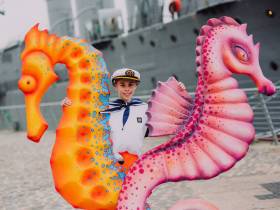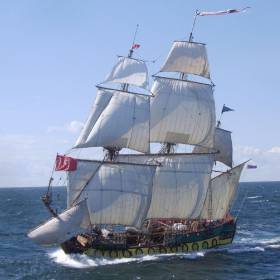Displaying items by tag: Belfast Maritime Festival
All Aboard for a Weekend of Fun at Belfast Maritime Festival This Weekend
Visitors can discover a treasure trove of free activities at this weekend’s Belfast Maritime Festival on Saturday 9 and Sunday 10 September.
Taking place along the city’s Maritime Mile, with entertainment stretching across Queen’s Quay to HMS Caroline in the Titanic Quarter, the festival celebrates Belfast’s rich maritime heritage and spirit of innovation.
Come along from 11am each day to enjoy live music, street entertainers and activities for all ages. The main festival stage, compered by BBC presenter Gemma Bradley, is at Titanic Slipways, along with the ‘Science Street’ interactive area, a colourful Belfast Bazaar, featuring the very best local produce and crafts, and a picnic area.
Lord Mayor of Belfast, Councillor Ryan Murphy said: “There’s so much to see and do at this weekend’s Belfast Maritime Festival, with a fantastic line-up of events to really bring our maritime and industrial heritage to life.
“Come on down to hear amazing live music, shop local at the Belfast Bazaar market, entertain the kids with free activities or even get involved yourself at ‘Science Street’.
“Walk, cycle or take the Glider or train to experience everything the festival has to offer, soak up the atmosphere and enjoy the stunning ships which will make Belfast their home for the weekend.”
The Belfast Maritime Festival has been organised by Belfast City Council and is supported by Tourism NI, delivered in partnership with Maritime Belfast Trust, Belfast Harbour, Odyssey Trust, the Department for Communities and Titanic Quarter Ltd.
Aine Kearney, director of events at Tourism NI said: “Tourism NI is delighted to support the return of the Belfast Maritime Festival, a much-needed post-pandemic boost to the wider tourism and hospitality industry with a projected economic benefit of circa £1.5 million.
“The event is a great opportunity to showcase this key Titanic and Maritime Belfast heritage destination and its wealth of visitor experiences. This immersive event will further awaken the giant spirit in our visitors, igniting their sense of discovery and demonstrating the warm welcome Northern Ireland offers to all.”
Activities at Belfast Maritime Festival include:
- Visiting ships and vessels docked at Queen’s Quay and Belfast Harbour Marina: hop on board the Irish Lights vessel Granuaile and tall ships Gunilla, Leader, Brian Boru and La Malouine to chat to the crew and experience life on the high seas!
- Titanic Slipways hosts the festival’s first ‘Science Street’: a chance for young and old to explore areas like marine biology, engineering and navigation through fun interactive activities, demonstrations and live shows.
- Duke Special, Joshua Burnside, Manukahunney, ROE and NI Opera will lead a stellar line-up of over 100 leading musicians from across NI. Hear Americana, trad, jazz, opera, bluegrass, classical and more on the main stage at Titanic Slipways, as well as outdoor venues across the Maritime Mile.
- The Kids’ Zone at Queen’s Quay will be packed full of activities for little explorers, including a sensory area, dance workshops, crafts, face painting, a pop-up aquarium and even a beach to build some sandcastles!
- The free Maritime Mile Through My Lens exhibition at Hamilton Dock, delivered by Belfast Maritime Trust and Belfast Exposed, showcases photographs taken by local communities to demonstrate what they love about living along the waterfront.
- Belfast Lough Sailability will have free participatory taster sessions for visitors, including those with a disability, to experience the fun of getting out on the water.
- Further along at Sailortown, bookable activities include an evening of music, poetry and film, maritime-themed bingo and a chance to explore the beautiful St Joseph’s Church as part of European Heritage Open Days.
- There are also free walking tours, demonstrations of traditional seafaring skills like rope making and boat building, as well as special hydrobike sessions.
For more event information, visit belfastcity.gov.uk/maritime.
#MaritimeFestivals - Sea cadets have navigated as the first of the Tall Ships to dock in Belfast Harbour ahead of the annual Maritime Festival (19-20 May) which gets underway on Saturday and Sunday.
With the wind in its sails, ITV News reports that the TS Royalist cut through the water on its way into Belfast Lough (to anchor) on Thursday.
The sea cadets on board pulled together effortlessly as a team.
They've spent a week at sea - some learning the ropes - others building on skills from previous sea-faring adventures.
Two of the cadets are from Northern Ireland and highly recommend the training.
Alexandra McCullough told UTV: “You get a lot of character building and everybody works together as a team, nobody is left out.
“I get confidence on board, you get to meet new friends.”
For much more on the forthcoming festival this weekend click here.
Full Sails For Belfast Maritime Festival This Weekend
#TallShips - This year’s Belfast Maritime Festival kicks off tomorrow (Friday 16 June) with a chance to climb aboard some of the visiting tall ship flotilla, as the Belfast Telegraph reports.
The Phoenix, Earl of Pembroke and Kaskelot welcome visitors who will also witness the Russian frigate Shtandart, one of the standouts of what’s been dubbed ‘The Voyage’.
The fleet have sailed to Belfast Lough after many of their number took over Drogheda last weekend, and Dublin Port the weekend previous.
Adding to the spectacle will be visiting vessels from both the Naval Service and Royal Navy.
But it’s not all about the big boats, as other highlights of the weekend include try-sailing outings for people of all abilities with Belfast Lough Sailability, while the Lagan Dragons — Northern Ireland’s only dragon boat team comprising breast cancer survivors — will race to the cheers of the crowd.
The Belfast Telegraph has more on the story HERE.































































